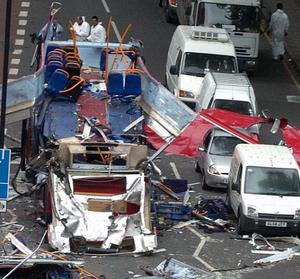7/7 London bombing attacks: five years on7/7 London bombings: "The rules of the game have changed"
Two weeks after the 7 July attacks, the then prime minister, Tony Blair, called a press conference at which he warned: “Let no one be in doubt. The rules of the game have changed”; he outlined twelve new measures that aimed to transform the landscape of British counterterrorism; together, they were intended to offer a greater degree of collective security; each came at considerable cost to the liberties of both individuals and groups of people; the controversial Terrorism Act 2006 passed after the 7 July bombings has led to increased arrests and convictions

Aftermath of the London bus bombings of 2005 // Source: dailymail.co.uk
On 6 July 2005, Eliza Manningham-Buller, the head of MI5, met a group of MPs from the Labor whips’ office to discuss the threat to the United Kingdom. There was, she assured them, no reason to believe that an attack was imminent. The following morning, Sir Ian Blair, then commissioner of the Metropolitan police, told the BBC that his force was “the envy of the policing world in relation to counterterrorism.”
Shortly after that statement the first of the bombs went off.
Two weeks later, just as the country was beginning to overcome the initial shock of four suicide bombings that caused the deaths of 52 people and injured more than 950, many seriously, came the attempted bombings of 21 July. The Guardian’s Ian Cobain writes that for the public, the bombs that failed to explode triggered almost as much alarm as those that did, with the second attempt bringing home the realization that they could be vulnerable to a series of onslaughts by al Qaeda-inspired jihadists. Within government and law-enforcement circles, the shock caused by the two incidents can only have been exacerbated by the institutional belief, widely held during the early summer of 2005, that the threat of a terrorist attack had subsided.
Two weeks later the then prime minister, Tony Blair, called a press conference at which he warned: “Let no one be in doubt. The rules of the game have changed.”
He outlined twelve new measures that aimed to transform the landscape of British counterterrorism. Together, they were intended to offer a greater degree of collective security; each came at considerable cost to the liberties of both individuals and groups of people.
It was a polarizing moment. Sir Ian Blair could have been speaking for all those tasked with guaranteeing that collective security when he declared himself to be “very pleased” with the proposed measures. Even as he spoke, his officers were selecting suspects to be targeted. Gareth Peirce, the leading defense lawyer and a veteran campaigner against the excesses of the British state at times of crisis, condemned Tony Blair’s proposals as “a statement of dangerous self-delusion, deliberately ignoring history, legality, principle and justice”.
Cobain notes that in the event, some of the proposed new powers, such as those that would allow the government to order the closure of places of worship, were quietly shelved. Others, such
